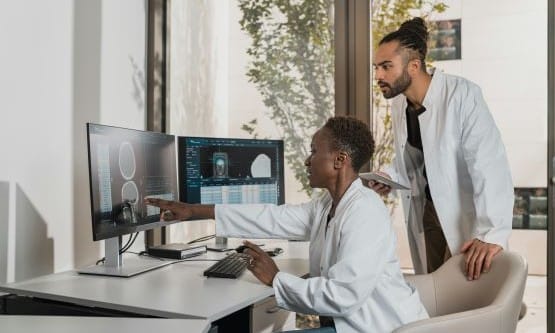National programme PACS suppliers announced
- 10 May 2004
The Department of Health has today announced that every hospital trust in England should get a picture archiving and communications system (PACS) within three years as part of the National Programme for IT (NPfIT).
Some £60m of national investment will go into PACS this year, with future central funds to be announced. The shoftfall in meeting the costs of buying and locally implementing PACS systems will have to be met by local NHS trusts.
According to the Department of Health PACS technology will begin to be rolled out from this summer through five Local Service Providers (LSPs). The goal is for national coverage to be completed within three years.
Some 178 acute trusts are to have PACS systems implemented, beginning this summer. The aim is to be 80% completed within two years and the remaining 20% will be completed by the end of the following year. Currently 25 acute trusts have PACS technology.
Some £60m of central investment is being made available for PACS investment this year. A national programme spokesperson told EHI: "This year £60m is being made available to bridge any funding gaps this year. An announcement on funding for subsequent years will be made later."
The spokesperson confirmed that funding would go to clusters that sign up to PACS programmes delivered by their LSP. "Central funds will be made available to clusters who agree with LSP priorities for local PACS investment."
He added: “Central capital is aimed to brdge initial affordability gaps, it will be supplemented by capital and revenues from trusts.” He claimed the cash releasing benefits of PACS "will fully meet this local requirement".
Dr Keith Foord, consultant radiologist at East Sussex Hospitals NHS Trust and secretary of the Royal College of Radiologists PACS and Teleradiology Interest Group, told E-Health Insider the news on PACS was extremely welcome. “We are extremely pleased that there has been an announcement, finally.”
Dr Foord said that clarification was extremely welcome after a long period of delay and uncertainty. “It’s been going on for so long that it has caused delays for the past two years. Hopefully the announcement will now take the bung out of the system.”
He said that his concerns focused on whether there would be enough funding; whether hospitals’ radiological infrastructure would be good enough; and whether PACS will be fully integrated with RIS (Radiological Information Systems).
GE is the biggest winner in the contracts announced today, being selected to have the “right” to be PACS supplier for three of the five LSPs – Southern, Eastern and North East; with Philips chosen for London – ‘subject to contract’; and Kodak and ComMedica chosen for the North West and West Midlands.
The new PACS systems to be delivered will enable images such as X-rays and scans to be stored and mailed electronically rather than printed on film and filed manually – enabling doctors to provide a much faster diagnosis.
Health minister John Hutton said: “This ground-breaking deal is a great example of how investment in the IT infrastructure is helping to deliver better patient care.
Hutton added: “The digital image will follow the patient wherever they go and will be able to be recalled whenever and wherever they need to be accessed by a patient’s healthcare professional."
Richard Granger, Director General of NHS IT, said the PACS arrangements represented "the best possible deal" for the NHS. “We have negotiated a substantial reduction in the average price of a PACS system. This deal is providing better quality systems for a lower cost with increased functionality and these will be fully compliant with the NHS Care Record Service.”
Details of the discounts negotiated, the value of contracts, or how much trusts will have to pay locally to implement PACS locally were not disclosed.
Professor Aidan Halligan, deputy chief medical officer and joint director general of the NPfIT, said: "Today’s announcement has wide-ranging clinical and patient benefits. “In addition to patients not having to wait whilst their X-rays are processed and delivered by hand from one department to another, clinicians will no longer have to hold X-rays up to a light box in A&E to make a diagnosis.
The rights to supply PACS have been awarded to:
- Fujitsu with GE for the Southern Cluster;
- BT with Phillips – subject to contract – for the London Cluster;
- Accenture with GE for the East and East Midlands Cluster;
- Accenture with GE for the North East Cluster; and
- CSC with Kodak and ComMedica for the North West and West Midlands Cluster.




